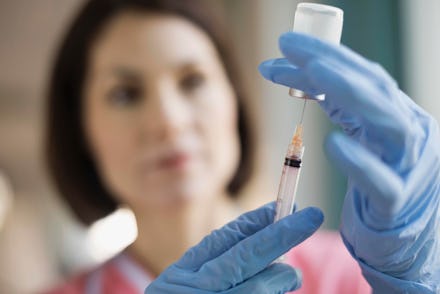One Chart Shows How Many Times Vaccines Have Ever Caused Autism

That's exactly how many cases of autism have been scientifically linked to vaccinations: absolutely none. Time and again, research has demonstrated that the 1998 "groundbreaking" study linking vaccines to autism was just bad science with no basis in reality. But now there's an even more conclusive study, one that included nearly 1.3 million subjects.
Posted online last week in the medical journal Vaccine, a new meta-analysis comes right out and says its findings in the study's title: "Vaccines are not associated with autism: An evidence-based meta-analysis of case-control and cohort studies." A team of researchers from the University of Sydney analyzed a collection of the "available evidence from case-control and cohort studies" that "assessed the relationship between vaccine administration and the subsequent development of autism or autism spectrum disorders (ASD)," according to the paper's abstract. This led to some pretty remarkable findings, all of which the authors clearly indicated in the paper's "highlights:"
1. Five cohort studies involving 1,256,407 children and five case-control studies involving 9920 children were included in this analysis.
2. There was no relationship between vaccination and autism (OR: 0.99; 95% CI: 0.92 to 1.06).
3. There was no relationship between vaccination and ASD [autism spectrum disorder] (OR: 0.91; 95% CI: 0.68 to 1.20).
4. There was no relationship between [autism/ASD] and MMR (OR: 0.84; 95% CI: 0.70 to 1.01).
5. There was no relationship between [autism/ASD] and thimerosal (OR: 1.00; 95% CI: 0.77 to 1.31).
6. There was no relationship between [autism/ASD] and mercury (Hg) (OR: 1.00; 95% CI: 0.93 to 1.07).
7. Findings of this meta-analysis suggest that vaccinations are not associated with the development of autism or autism spectrum disorder.
While a parent's worrying concern can be a major factor, 1,256,407 data points should be enough to clearly and definitively show that vaccines do not cause autism or autism spectrum disorder. But to that point, the authors shared their feelings in the study's epilogue:
"As an epidemiologist I believe the data that is presented in this meta-analysis. However, as a parent of three children I have some understanding of the fears associated with reactions and effects of vaccines. My first two children have had febrile seizures after routine vaccinations, one of them a serious event. These events did not stop me from vaccinating my third child, however, I did take some proactive measures to reduce the risk of similar adverse effects. [...] As a parent I know my children better than anyone and I equate their seizures to the effects of the vaccination by increasing their body temperature. For parents who do notice a significant change in their child's cognitive function and behaviour after a vaccination I encourage you to report these events immediately to your family physician and to the 'Vaccine Adverse Event Reporting System'."
As the author notes, no one knows a child better than his or her parent, but even when fears like these are present, the science remains incontrovertible. So, as much as C-list celebrities like Jenny McCarthy and Alicia Silverstone can stand on their soapboxes and make grand, scary claims about the dangers of vaccines, and as much as pseudoscientific lies circulate and gain momentum among confused and concerned people, the fact of the matter remains: Vaccines do not cause autism and thinking otherwise is not only wrong, but incredibly dangerous.